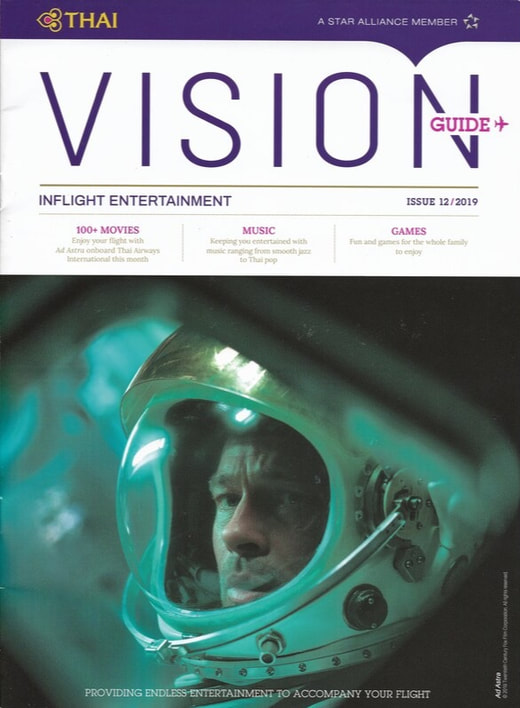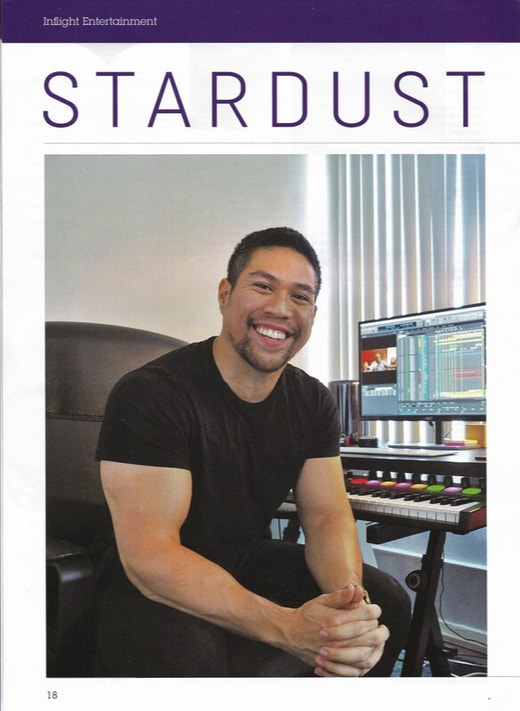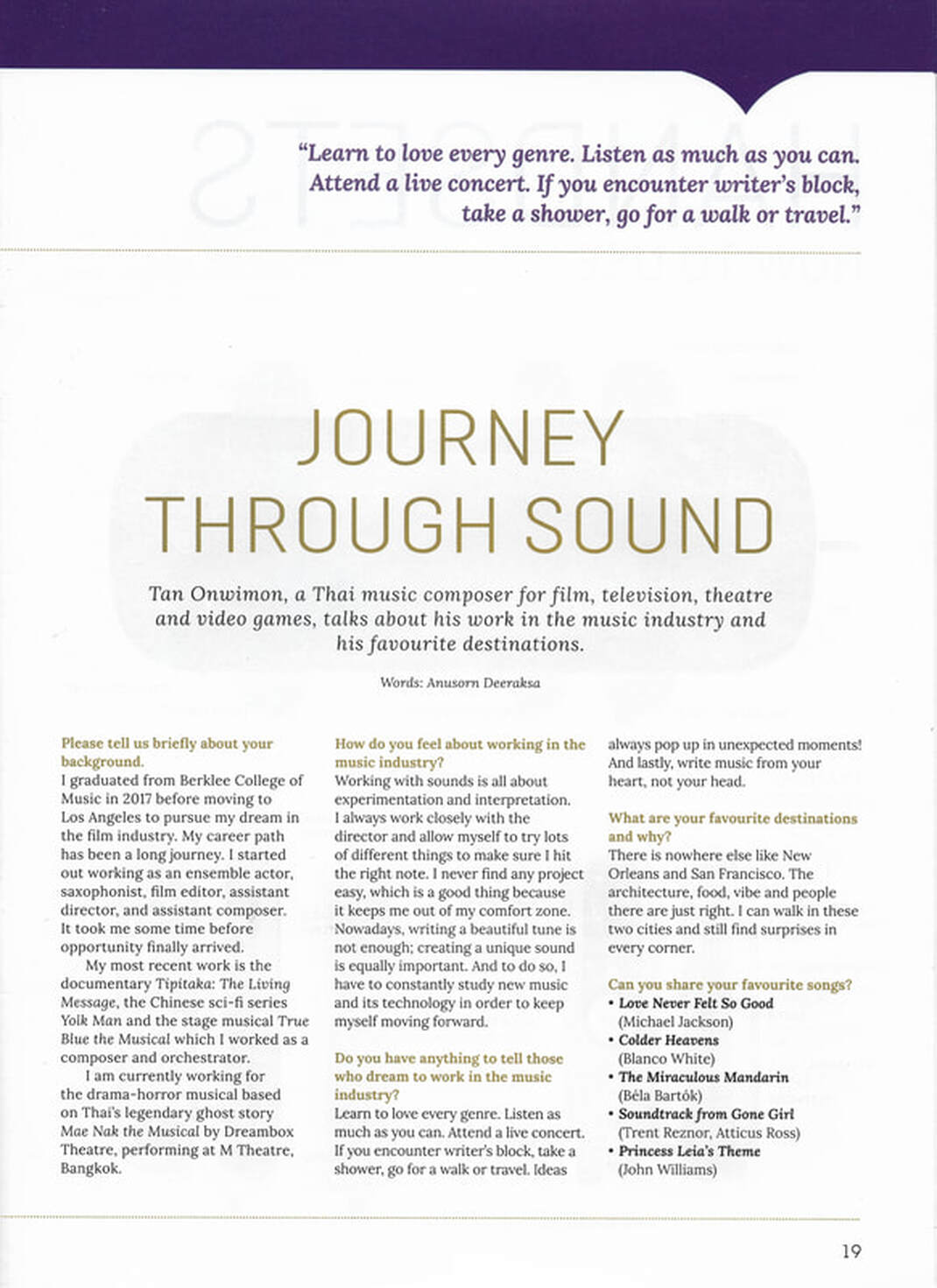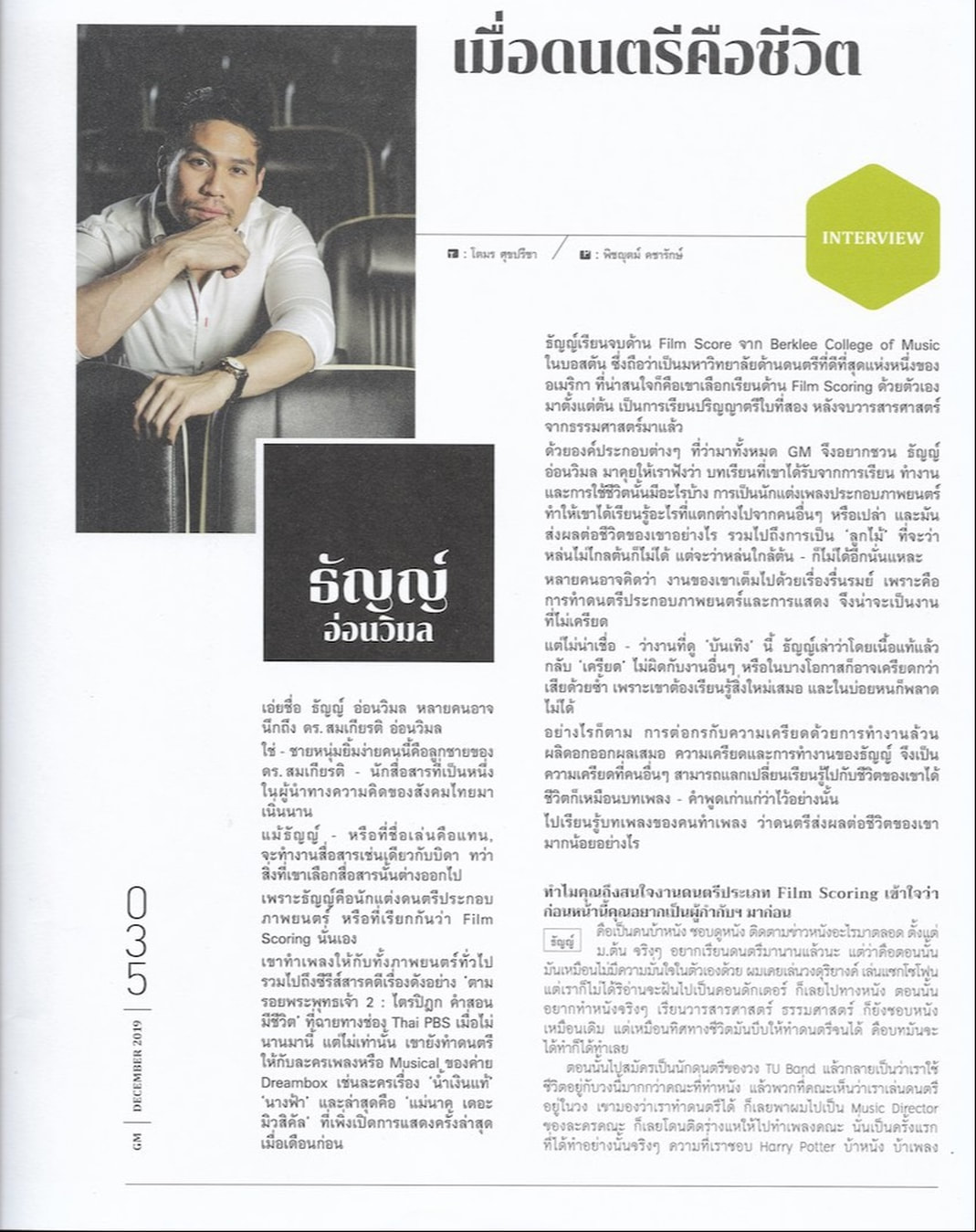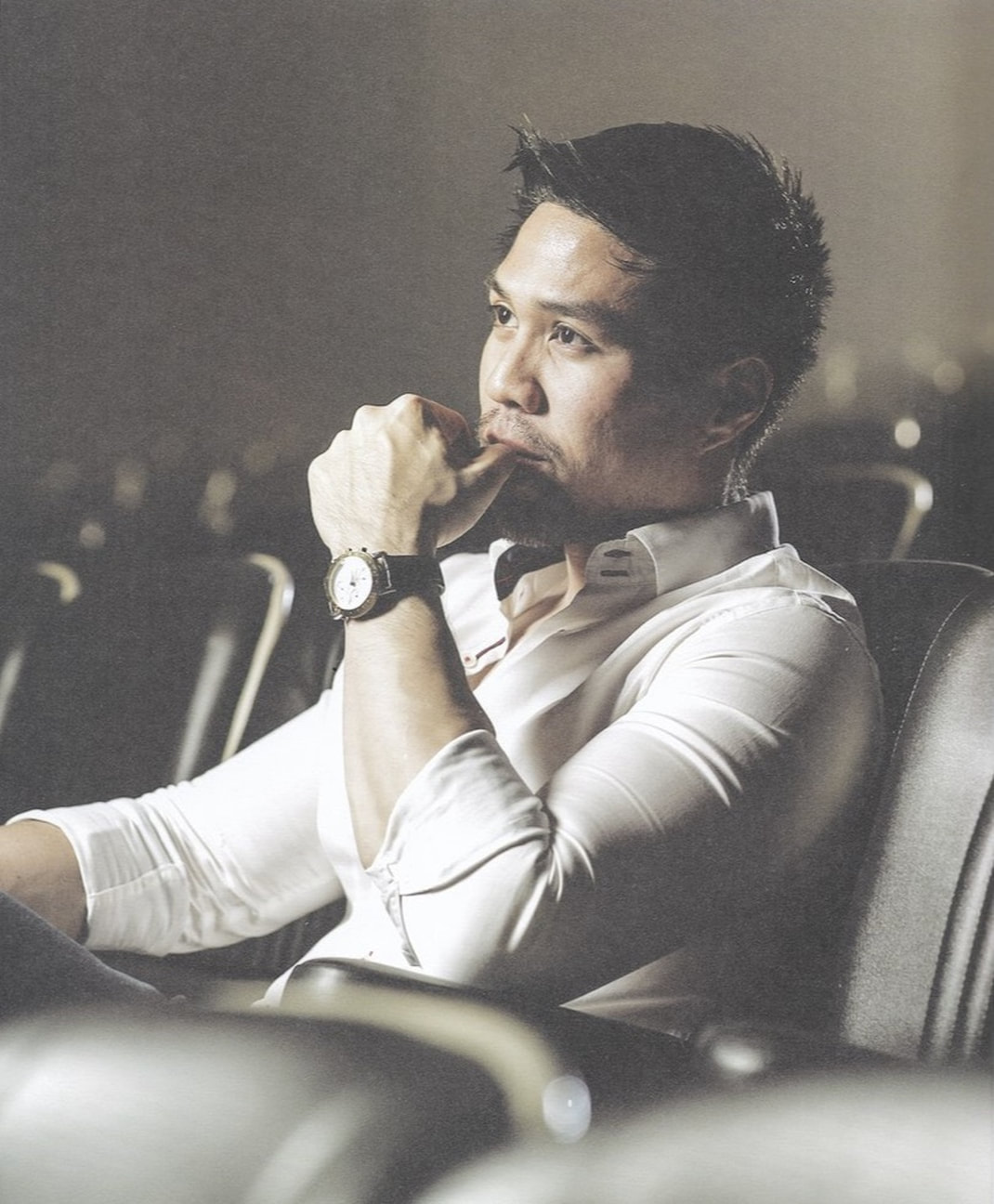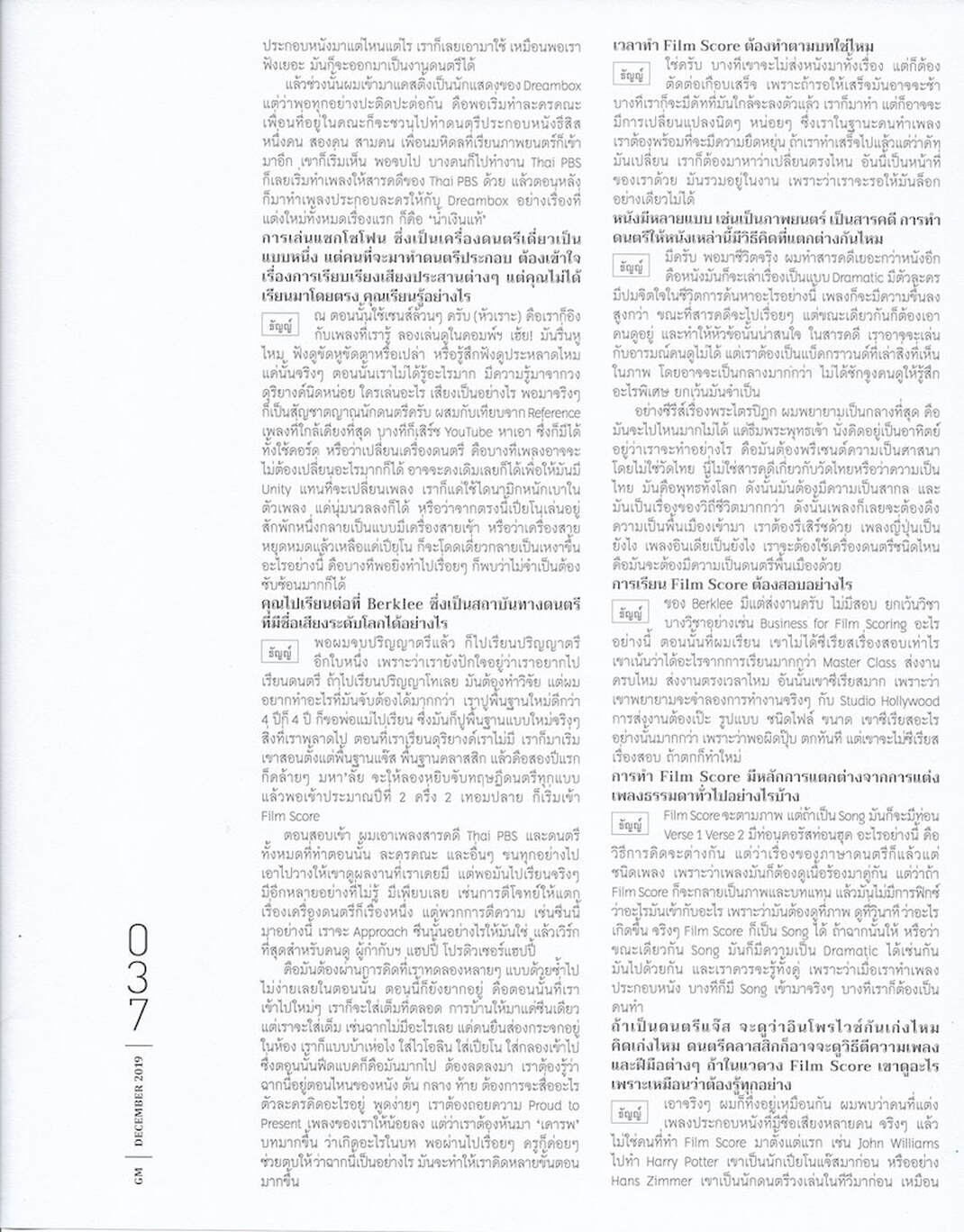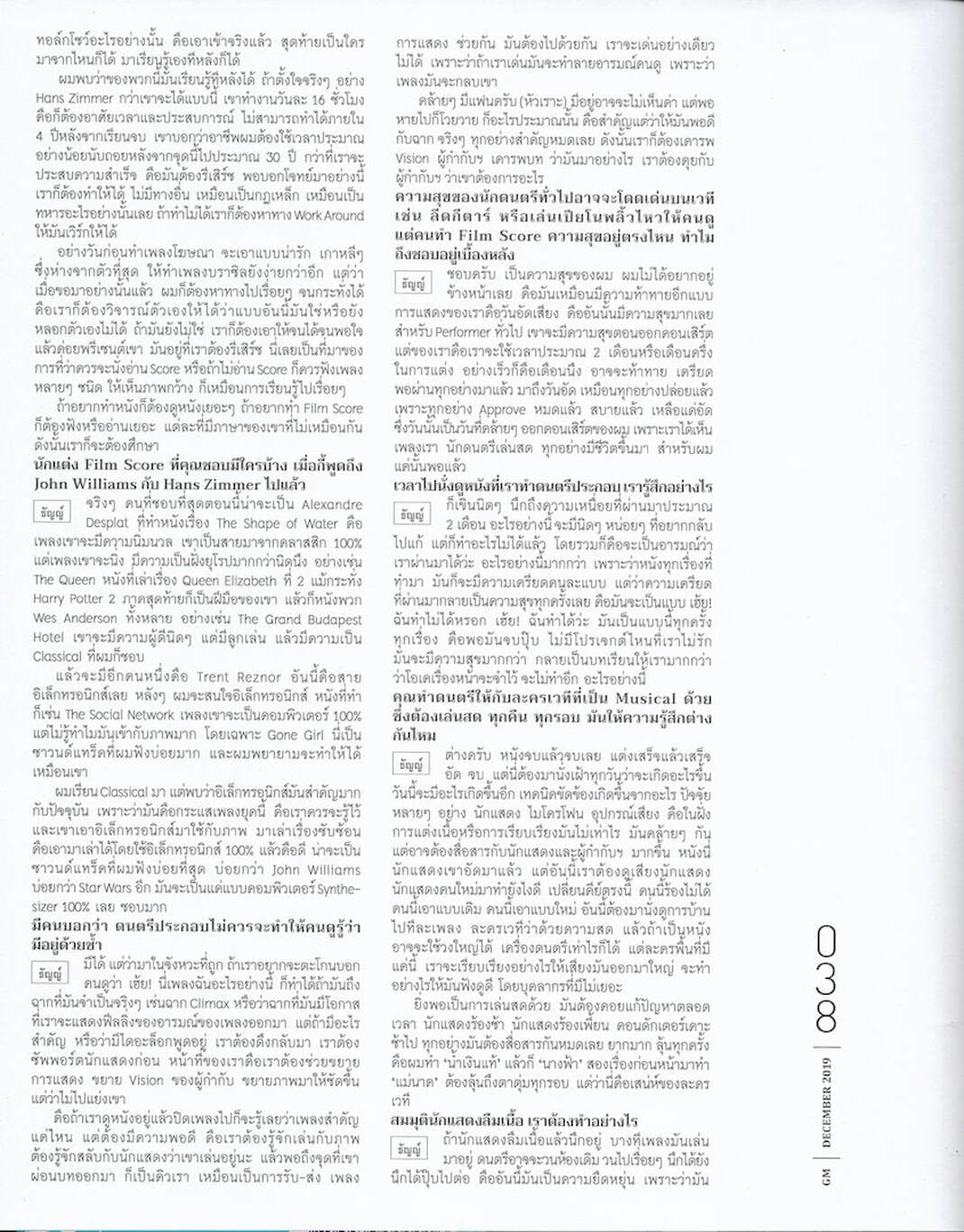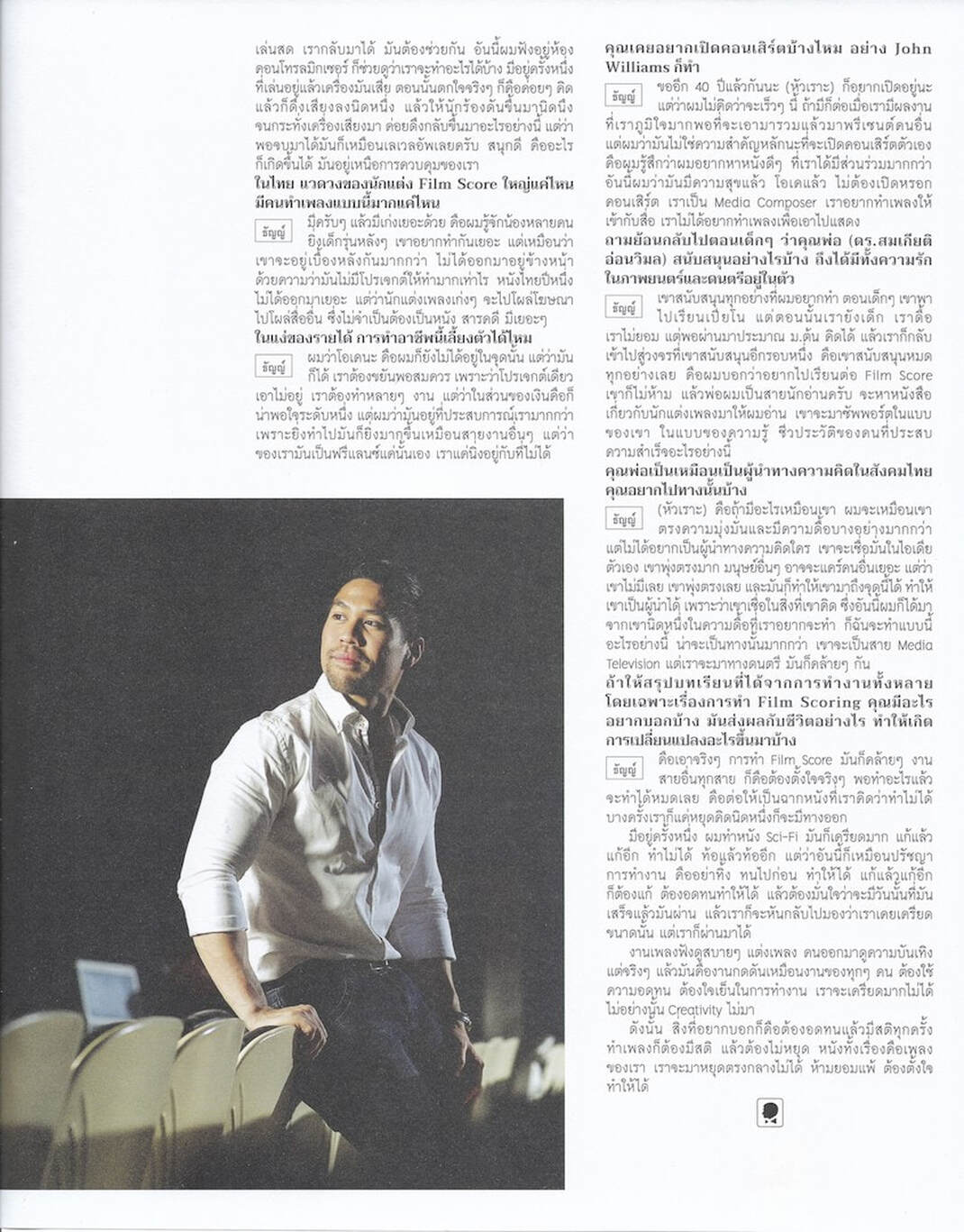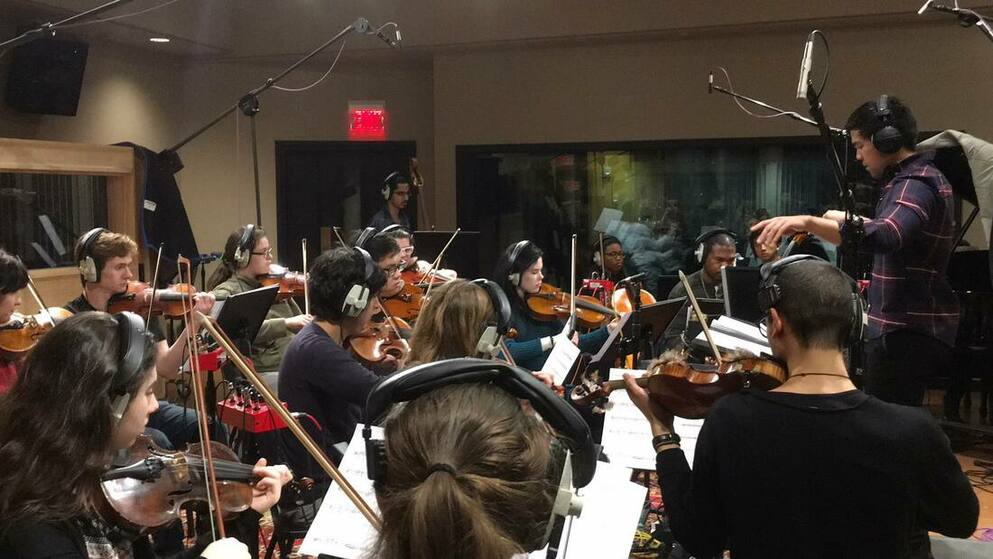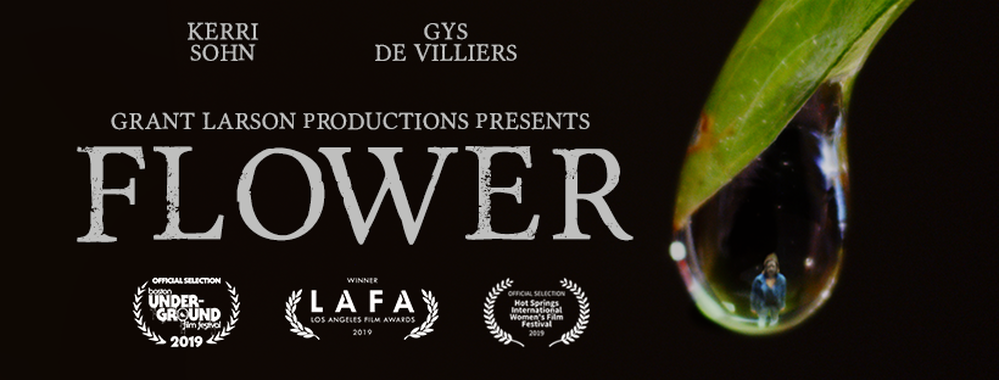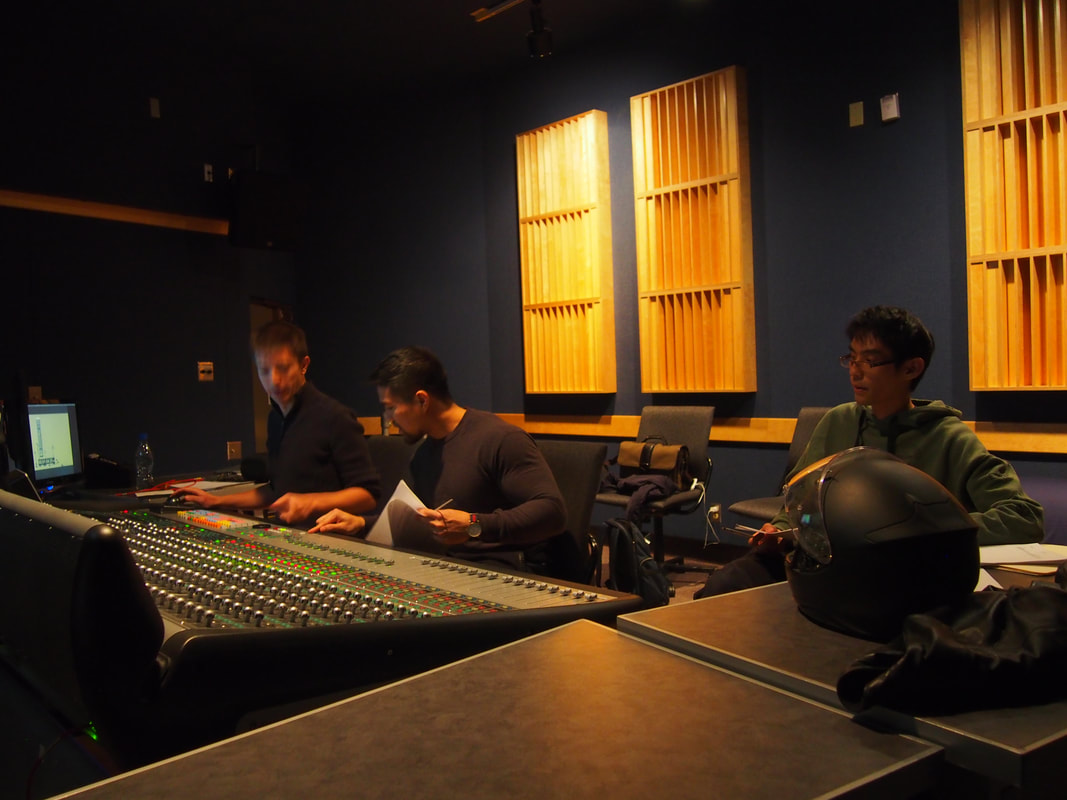INTERVIEW WITH FILM SCORER TAN ONWIMON
GM |
An INTERVIEW with TAN ONWIMON
a f i l m m u s i c c o m p o s e r f r o m B e r k l e e' s t o p s i x i n c l a s s e x p l o r i n g l i f e a n d c h a s i n g d r e a m i n H o l l y w o o d
1 April 2019
THAIVISION
From an aspiring filmmaker to a musical theatre actor, and from a passionate saxophonist to an accredited music composer, Tan Onwimon is undoubtedly one of Thailand’s most auspicious composers. His versatile ability to slither from genre to genre, from media to media, all in a short amount of time, has established his status as the up-and-coming composer to keep an eye on. It all started in his college years, when he was inspired to completely shift his career interest from film to music, which placed him in music-related positions in numerous theatrical productions, and later garnered him an award from Thammasat Music Contest. Today his is one of the first few names to come up as a composer in Thai film industry, known from his music scoring credits in “Tipitaka: The Living Message” (2019), “Yolk Man” (2019), “Beauty and the East” (2019), and his work co-orchestrating “The Secret of Immortal Code” (2017), Sonn: A New Musical (2018), the hit LINE TV series, “Strange Girl in a Strange Land” (2019) and of course, "National Parks of Thailand" (2018). He is currently working on a number of upcoming musical theatre productions and films currently in post-production in which we can’t disclose the title. We have an opportunity to have a conversation with him about his successful career in film scoring and music composing, and how it feels to be one of the most sought after composers in Thailand.
THAIVISION
From an aspiring filmmaker to a musical theatre actor, and from a passionate saxophonist to an accredited music composer, Tan Onwimon is undoubtedly one of Thailand’s most auspicious composers. His versatile ability to slither from genre to genre, from media to media, all in a short amount of time, has established his status as the up-and-coming composer to keep an eye on. It all started in his college years, when he was inspired to completely shift his career interest from film to music, which placed him in music-related positions in numerous theatrical productions, and later garnered him an award from Thammasat Music Contest. Today his is one of the first few names to come up as a composer in Thai film industry, known from his music scoring credits in “Tipitaka: The Living Message” (2019), “Yolk Man” (2019), “Beauty and the East” (2019), and his work co-orchestrating “The Secret of Immortal Code” (2017), Sonn: A New Musical (2018), the hit LINE TV series, “Strange Girl in a Strange Land” (2019) and of course, "National Parks of Thailand" (2018). He is currently working on a number of upcoming musical theatre productions and films currently in post-production in which we can’t disclose the title. We have an opportunity to have a conversation with him about his successful career in film scoring and music composing, and how it feels to be one of the most sought after composers in Thailand.
THAIVISION: Thank you for sitting down with Thaivision today. We heard you recently finished scoring an NHK original documentary, what can you tell us about this project?
Tan: “Thank you for having me. Indeed I just stepped out of the studio after spending quite some time on this very interesting documentary. It is called Duck Academy, or The Duck Master as the Japanese title. It’s a collaboration between Payai Creation and NHK, it is an incredibly heartwarming story of a 3,000-duck farm. It is one of my favorite and I had a great time working on this project. My team and I are extremely proud of it as we were the only team specifically chosen by a gigantic client such as NHK. It’s an amazing opportunity that could escalate us on an international scale.”
THAIVISION: How do you even score a documentary about ducks?
Tan: (laughs) “I was astonished at first, definitely. I had to call Yon, the director, to clarify his vision. We had a really long conversation and exchange ideas, which led to the conclusion that we would like the score to be cute, whimsical and friendly. It is a story of 3,000 ducks being raised in a free-range environment, that sounds tumultuous in itself. We were able to explore a comical melody, some fun techniques to accentuate on the cuteness of these ducks. It was very entertaining trying to figure out the right sound, at the right moment.”
THAIVISION: Does it mean that most projects start off quite difficult?
Tan: “The beginning is always the hardest. Starting from zero, trying to analyze the vision, and executing it appropriately, these are the most challenging steps. After that, it’s basically just a race against the deadline. During those critical moments, in the beginning, it is important to be on the same page as the director. I usually ask the director right then, what effects do they need from my music, it’s not always easy to find the language to describe music but that is the fun part of my job. I love dissecting ideas, thoughts, visions that could come with simply a word, an adjective or a sentence. In the end, it would be my job to translate those pitch into music.”
Tan: “Thank you for having me. Indeed I just stepped out of the studio after spending quite some time on this very interesting documentary. It is called Duck Academy, or The Duck Master as the Japanese title. It’s a collaboration between Payai Creation and NHK, it is an incredibly heartwarming story of a 3,000-duck farm. It is one of my favorite and I had a great time working on this project. My team and I are extremely proud of it as we were the only team specifically chosen by a gigantic client such as NHK. It’s an amazing opportunity that could escalate us on an international scale.”
THAIVISION: How do you even score a documentary about ducks?
Tan: (laughs) “I was astonished at first, definitely. I had to call Yon, the director, to clarify his vision. We had a really long conversation and exchange ideas, which led to the conclusion that we would like the score to be cute, whimsical and friendly. It is a story of 3,000 ducks being raised in a free-range environment, that sounds tumultuous in itself. We were able to explore a comical melody, some fun techniques to accentuate on the cuteness of these ducks. It was very entertaining trying to figure out the right sound, at the right moment.”
THAIVISION: Does it mean that most projects start off quite difficult?
Tan: “The beginning is always the hardest. Starting from zero, trying to analyze the vision, and executing it appropriately, these are the most challenging steps. After that, it’s basically just a race against the deadline. During those critical moments, in the beginning, it is important to be on the same page as the director. I usually ask the director right then, what effects do they need from my music, it’s not always easy to find the language to describe music but that is the fun part of my job. I love dissecting ideas, thoughts, visions that could come with simply a word, an adjective or a sentence. In the end, it would be my job to translate those pitch into music.”
THAIVISION: What are the differences between working with each director?
Tan: “Every time we start a new project with a new director, it kind of reminds me of changing classmates in school. They are all different, and they bring different things to the table. I have learned so much from each of them individually, so I respect them immensely. Not to mention, the things they had to go through before getting to me in post-production, they’ve been through a lot and their passion inspire me to do my best and write them the best score they could use.”
THAIVISION : Congratulations on the awards your film “Flower” have received from Los Angeles Film Festival and making a festival rounds around the states, can you elaborate on the project?
Tan: “Thank you! 'Flower' was a long journey. Years ago when I first met the production team, I was extremely nervous. It was one of the first actual film studios I’ve been in, especially to pitch to the producers and got the job. This truly the first project I took on alone as a composer, in the middle of a diverse international crew. The project gave me so many lessons to learn and I’m grateful for it.”
THAIVISION : Was it challenging scoring an award-winning film?
Tan: “Since the first day I read the script, I have the utmost faith in the project. The screenplay was very unique and the director's vision was clear. The film is a zombie flick amongst numerous modern zombie flicks, so the challenge was to stand out. The solution we came up with relies heavily on the score. I had to compose something so out of place and awkward. While giving the film a peculiar sound, I got to experiment with strings and unusual instruments like Balalaika, a Russian guitar, resulting in a very out of this world score. The director and the producer loved it and called it a successful experiment (laughs). I like to think that the score differentiates the movie from other zombie flicks.”
Tan: “Every time we start a new project with a new director, it kind of reminds me of changing classmates in school. They are all different, and they bring different things to the table. I have learned so much from each of them individually, so I respect them immensely. Not to mention, the things they had to go through before getting to me in post-production, they’ve been through a lot and their passion inspire me to do my best and write them the best score they could use.”
THAIVISION : Congratulations on the awards your film “Flower” have received from Los Angeles Film Festival and making a festival rounds around the states, can you elaborate on the project?
Tan: “Thank you! 'Flower' was a long journey. Years ago when I first met the production team, I was extremely nervous. It was one of the first actual film studios I’ve been in, especially to pitch to the producers and got the job. This truly the first project I took on alone as a composer, in the middle of a diverse international crew. The project gave me so many lessons to learn and I’m grateful for it.”
THAIVISION : Was it challenging scoring an award-winning film?
Tan: “Since the first day I read the script, I have the utmost faith in the project. The screenplay was very unique and the director's vision was clear. The film is a zombie flick amongst numerous modern zombie flicks, so the challenge was to stand out. The solution we came up with relies heavily on the score. I had to compose something so out of place and awkward. While giving the film a peculiar sound, I got to experiment with strings and unusual instruments like Balalaika, a Russian guitar, resulting in a very out of this world score. The director and the producer loved it and called it a successful experiment (laughs). I like to think that the score differentiates the movie from other zombie flicks.”
THAIVISION: So you enjoy experimenting in music?
Tan: “Both as a filmmaker and a film score composer, I thrive on taking risks. It’s what keeps the experience exciting and unique. This is the age of overwhelming contents being released in the cinema, streaming services, and TVs. The audience expects something different that would hook them, so we as a content creator should take more risks to give the audience new experiences. By making sure that the content we created is always fresh, that is how to keep the industry going and keep the interest of the audience.”
THAIVISION: This seems like a big year for you. What are you working on in 2019?
Tan: “It’s kind of overwhelming, actually. But it is a dream come true for a composer to have a constant stream of projects to work on. Most of the films releasing this year are the results of the hard work I did a couple of years ago. Filmmaking requires patient because it takes time before we have a final product that is 100% complete. The score is a small part of the film so by the time they release the film, I had moved on to new projects. It makes me happy when I see some projects I worked on years ago are finally being released. This year, in the musical theatre department, I am happy to announce that I will be working on the orchestration of all 3 shows produced by Dreambox Theatre in Thailand. Moreover, another project called “See” by Stetson Gleave and “Yolk Man” is finally being released as well.”
Tan: “Both as a filmmaker and a film score composer, I thrive on taking risks. It’s what keeps the experience exciting and unique. This is the age of overwhelming contents being released in the cinema, streaming services, and TVs. The audience expects something different that would hook them, so we as a content creator should take more risks to give the audience new experiences. By making sure that the content we created is always fresh, that is how to keep the industry going and keep the interest of the audience.”
THAIVISION: This seems like a big year for you. What are you working on in 2019?
Tan: “It’s kind of overwhelming, actually. But it is a dream come true for a composer to have a constant stream of projects to work on. Most of the films releasing this year are the results of the hard work I did a couple of years ago. Filmmaking requires patient because it takes time before we have a final product that is 100% complete. The score is a small part of the film so by the time they release the film, I had moved on to new projects. It makes me happy when I see some projects I worked on years ago are finally being released. This year, in the musical theatre department, I am happy to announce that I will be working on the orchestration of all 3 shows produced by Dreambox Theatre in Thailand. Moreover, another project called “See” by Stetson Gleave and “Yolk Man” is finally being released as well.”
THAIVISION: I heard that sometimes you also take on the role of an orchestrator?
Tan: “Yes. As an orchestrator, I have to work closely with the project composer, I need to use all the theories and experiences I earned to enhance the vision of the composer to its most effective. For example, in “The Secret of Immortal Code” (2018), that was a big project with a 3 million dollar budget. The pressure was real, topped with an 80-piece orchestra, I was excited and nervous, but I learned so much from Grant Fonda from the time we worked together. And this year, the first of 3 Dreambox productions called “Angels” is written by Kai-Kaiwan, we are working on it as we speak, my part in the project is to arrange the music in the Broadway-style realization.”
THAIVISION: What inspired you to come this far in this career path?
Tan: “My love of films. I love watching movies ever since I can remember. I’ve always wanted to be a filmmaker, a storyteller of some sort. I wanted to see my story being told through the screen, whether visually, audibly or musically. Every time I’m feeling down, I think of my high school self and remind myself of why I do what I do. My father is also another force to keep me going since he always supports me in everything I do. I want to make sure he gets to see me on the top of my game. It’s ok to feel down once in a while, but in this industry, persistence is the key, and I shall never give up.”
Thanks to Tan Onwimon for sitting down with Thaivision and tell us an inspiring story about himself. We hope to see more of your work in the future.
Tan: “Yes. As an orchestrator, I have to work closely with the project composer, I need to use all the theories and experiences I earned to enhance the vision of the composer to its most effective. For example, in “The Secret of Immortal Code” (2018), that was a big project with a 3 million dollar budget. The pressure was real, topped with an 80-piece orchestra, I was excited and nervous, but I learned so much from Grant Fonda from the time we worked together. And this year, the first of 3 Dreambox productions called “Angels” is written by Kai-Kaiwan, we are working on it as we speak, my part in the project is to arrange the music in the Broadway-style realization.”
THAIVISION: What inspired you to come this far in this career path?
Tan: “My love of films. I love watching movies ever since I can remember. I’ve always wanted to be a filmmaker, a storyteller of some sort. I wanted to see my story being told through the screen, whether visually, audibly or musically. Every time I’m feeling down, I think of my high school self and remind myself of why I do what I do. My father is also another force to keep me going since he always supports me in everything I do. I want to make sure he gets to see me on the top of my game. It’s ok to feel down once in a while, but in this industry, persistence is the key, and I shall never give up.”
Thanks to Tan Onwimon for sitting down with Thaivision and tell us an inspiring story about himself. We hope to see more of your work in the future.
|
Vertical Divider
|
Vertical Divider
|
Vertical Divider
|

